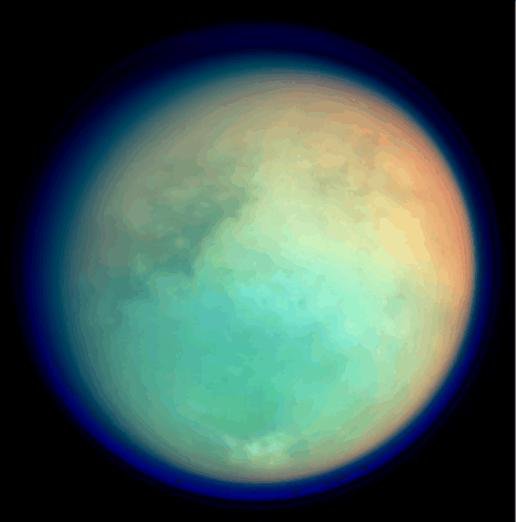Why We are Searching for Life on Titan
Titan is the largest moon of Saturn and the second largest in the solar system.
The moon Titan was first discovered by the Dutch astronomer Christiaan Huygens in 1655. He discovered Titan while studying the rings of Saturn.
Titan is larger than the planet Mercury, with a radius of 2,575 km. This does not mean it is more massive, it is actually only about half the mass of Mercury.
[1][2]
Titan is Earth-like
Titan has a thick atmosphere of carbon and methane. This allows many Earth-like processes to happen, although with methane instead of water.
Titan has a thick and dense atmosphere made out of mostly nitrogen and methane. The thick atmosphere and a frigid temperature of negative 180 degrees Celsius, allows methane to condense into a liquid. Methane pools on the ground in lakes and runs in rivers like Earth, and it even evaporates and comes back down as rain.
The surface of Titan also has very few impact craters. That means one thing, plate tectonics. Titan is made up of different massive plates just like Earth. These plates also lead to volcanoes and other Earth-like phenomena, like mountains.[3][4]
The Evidence of Life
Life requires a form of fluid to exist. That is found commonly enough on Titan. Scientists have also found evidence of organic molecules on the surface, although they have not been able to identify them.
Strange processes have also been observed that point to the possibility of life. Hydrogen molecules seem to float down from the upper atmosphere and disappear down at the surface. Scientists also find that there is a lack of acetylene, which is the most likely fuel source for life on Titan. Since Titan is so could a catalyst would be needed to turn acetylene back into methane, which isn’t likely. [5]
Titan is one of the most likely places in our solar system to harbor life. With the final dives of the Cassini spacecraft approaching there is no more time for close up pictures of Titan. Hopefully future expeditions can give us more information to work with.

Every time I see the word Huygens, I cannot prevent myself from having fun of a lot of my students trying to pronounce it correctly :D
Unfortunately, Titan is a bit far for settling up there once we will have screwed up Earth :D
yeah it is a bit cold
Few impact craters not always mean plate tectonic. atmosphere and hydrosphere could do the job. I wrote about it here
well that's interesting. I did use some older nasa posts so I guess I missed the newer stuff
It would be awesome if Titan had Oxygen like Earth, All we have to do is Light the lighter :D
I would rather not die. Maybe sending a space craft first is the better option.
The problem here is really the distance, IMO.
There's all sorts of sub-surface life all over the solar system- including HUMANS and other intelligent species- including right here on Earth.
including right here on Earth? As far as I know we haven't actually found any direct evidence of life anywhere else.
We haven't been told but it's there and I suspect that will be all coming out soon- the Germans were on Mars in the 1930s- TRUE STORY
Everything is an occult ritual. Demonology has been repackaged as planetary research and space exploration. All just versions of idolotry. You think the planets all are named after ancient pagan gods for no reason? NASA is a masonic lie. Time to wake up.
Did you know Saturn Worship is another name for satan worship? LOL The massive focus on saturn is not for no reason.